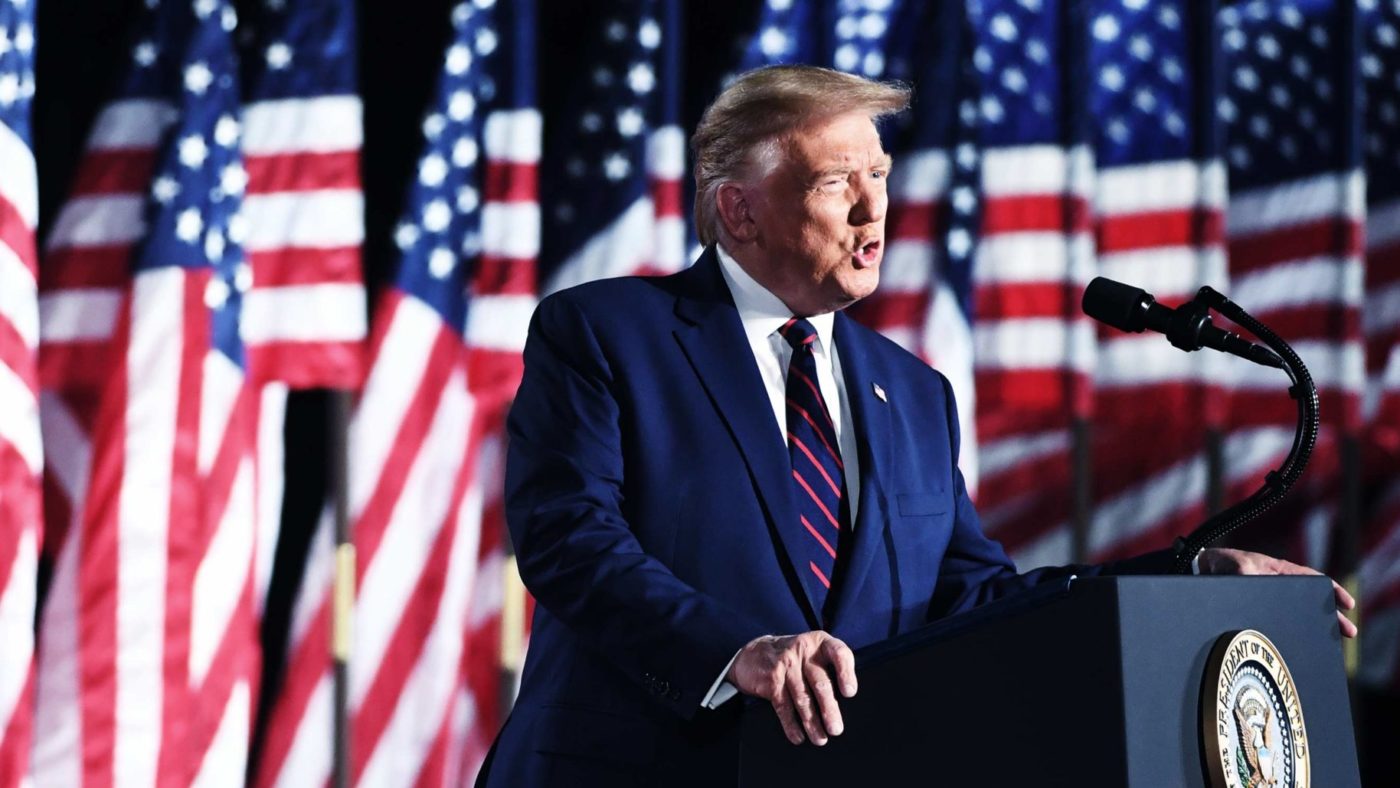Nasty presidential campaigns are not a modern vintage. In 1800 the contest between John Adams and Thomas Jefferson was vicious. Jefferson accused Adams of being pro-English, a calumny which Adams countered by revealing that the mock-moral Jefferson had fathered a child with Sally Hemings, one of his slaves. When Jefferson won the election. Adams left town before Jefferson accepted the laurels of office.
Which should serve to remind us, as the 2020 campaign descends into the gutter, that American politics is often brutal. That said, Donald Trump’s speech to the Republican National Convention from behind a fortress erected on the south lawn of the White House last Thursday was a reminder that he really is something new in American politics. Even though he mangled the nomination line – saying “I profoundly accept” when the scripted word was “proudly” – it was also a reminder of why he is so effective.
The key to President Trump is that he will say anything. The word “decorum” derives from a rhetorical strategy which means being appropriate. In the pursuit of victory, Trump is entirely without decorum. For example, the President’s use of the White House, from where he appeared on every day of the convention, the vice-president’s use of Fort McHenry and the illumination of the Washington Monument by fireworks for the convention’s finale appear to violate the Hatch Act, which forbids the use of federal property for explicit campaign purposes.
Trump’s message was empty to the point of maximum simplicity. Trump is good; Biden is bad. Trump will, as Mike Pence rather clumsily added, “make America great again, again”. Biden “takes his marching orders from liberal hypocrites who drive their cities into the ground”. The future of America is under threat from this man whose geniality is a pose.
The rest of the speech was platitudinous even by the standards of campaign rhetoric. We will build the greatest economy, said Trump, even though the pandemic has shattered what might otherwise have been his best campaign tune. America is now in recession, with unemployment in double digits. It was a rambling, unstructured address which touched on protests and policemen, vaccines and immigrants, trade deals and stock portfolios, school choice and tax cuts with the occasional irrelevant reminiscence about putting a man on the moon.
Yet to Trump the absence of a theme and an argument is not so much a deficiency as his very style itself. The Trump utopia is simply oblivious to proof. Rather than engage even cursorily with evidence, he simply asserted that his government’s handling of Covid-19 had been a triumph. He ignores the 6 million cases and 180,000 fatalities. It was all China’s fault, in any case.
Trump speaks as if the act of saying makes it so. There will be a vaccine, he declared, by the end of the year, and perhaps even sooner. “I have done more for the black community in three years than Joe Biden has done in 47”. The proof of these statements is not extrinsic to the rhetoric. The proof is him. If you believe in his character you accept the claim.
It is unlikely that Trump has read Aristotle but this is classical in origin. Aristotle said that the best speakers convey ethos, by which he means character. You may not like Trump’s character much but he assuredly has one and this is what makes him so effective. The campaign rests almost entirely on trust of the principal who says that he can still feel your pain.
It was notable that no previous Presidents spoke at the convention. There is a lot of evidence emerging that the American people may be tiring of Trump’s comportment. His character might yet be his undoing. If so, he has clearly decided to go down as himself. He is, sadly, as authentic as leaders come. He really is that awful.
In 1800, when he beat Adams, Jefferson’s speech was a model of rectitude. “Let us, then, fellow-citizens, unite with one heart and one mind” he said, in a lengthy passage of soothing talk. Every President since has called for the unity of the states in the aftermath of a divisive campaign. Every one except the 45th, Donald Trump. During his first candidacy, it was common to say of Trump that office would make him more conventional. He didn’t really mean what he said; it was just rhetoric. We have learnt since that he contains multitudes of inchoate prejudices and he means them all.
In The Rhetorical Presidency, the political scientist Jeffrey Tulis argued that Presidents can be classified as advocates of the “old way”, which was like an argument held in court, the “middle way”, which was an appeal both to Congress and to the people in the style of Theodore Roosevelt, or the “new way” in which the President, beginning with Woodrow Wilson, becomes more of a tribune of the people to Congress.
The book will have to be rewritten for President Trump who deserves his own category: the “wrong way”. Listen to him carefully. Perhaps more than any previous President by his words we can know him.
Click here to subscribe to our daily briefing – the best pieces from CapX and across the web.
CapX depends on the generosity of its readers. If you value what we do, please consider making a donation.


